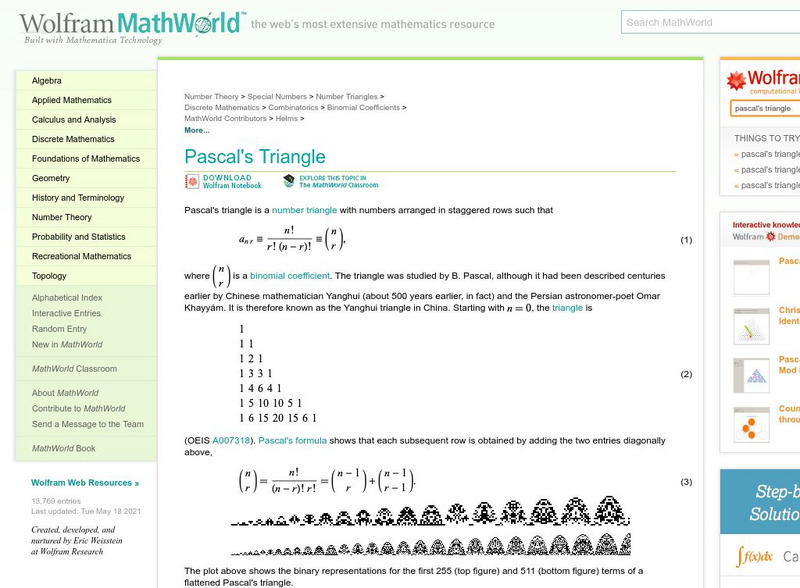Wolfram Research
Wolfram Math World: Pascal's Triangle
This site from MathWorld provides great information on Pascal's Triangle. Links are provided throughout for additional information, along with several helpful charts and formulas. This is a good site to check out on the subject.
Instituto Latinoamericano de la Comunicacion Educativa
Red Escolar: El Triangulo De Pascal
In Spanish. Find out about the life of Blaise Pascal who discovered the famous Pascal triangle. Use their interactive activities to learn how to fill out the Pascal triangle.
New Advent
Catholic Encyclopedia: Blaise Pascal
Excellent discussion of the life and work of this great scientist and mathematician. Describes his range of interests and notes his many contributions. Please note that ?The Catholic Encyclopedia? is a historic reference source and...
Curated OER
Science Kids: Science Images: Blaise Pascal
This image is of French physicist Blaise Pascal. He developed work on natural and applied sciences as well being a skilled mathematician and religious philosopher.
Curated OER
Smithsonian Libraries: Scientific Identity: Blaise Pascal (1623 1662)
A portrait of Blaise Pascal from the Dibner Library of the History of Science and Technology, made available through the Smithsonian Institution's Scientific Identity Collection.
Curated OER
Smithsonian Libraries: Scientific Identity: Blaise Pascal (1623 1662)
A portrait of Blaise Pascal from the Dibner Library of the History of Science and Technology, made available through the Smithsonian Institution's Scientific Identity Collection.
History of Computing Science
History of Computing Science: First Mechanical Calculator
Blaise Pascal, the seventeenth-century French mathematician, thinker, and scientist, built the first mechanical adding machine in 1642 based on a design described by Hero of Alexandria (2 CE) to add up the distance a carriage traveled.
Great Idea Finder
The Great Idea Finder: Adding Machine
The Great Idea Finder profiles the adding machine, invented by nineteen-year old mathematician Blaise Pascal in the year 1642.
Mathigon
Mathigon: Probability and Discrete Math: Introduction
This is an introduction to the study of probability. It tells the story of two of the greatest mathematicians, Blaise Pascal and Pierre de Fermat, who used coin tosses of heads or tails to determine who paid the bill. It led to the...
Curated OER
University of St Andrews: Blaise Pascal
This University of St. Andrews site contains biographical information and achievements of Blaise Pascal.
Curated OER
University of St Andrews: Blaise Pascal
This site from the University of Saint Andrews provides a short biography of Pascal. Takes a philosophical angle. Features links to existentialist philosophy, seventeenth and eighteenth century literature, and philosophy pages.
History of Computing Science
History of Computing Science: The First Mechanical Calculator
The Pascaline was the first mechanical adding machine and was developed by Blaise Pascal. This lecture series presents a brief description of the history of the machine and how it worked.
University of South Florida
Educational Technology Clearinghouse: Lit2 Go: History of Mathematics
Short selections from W. W. Rouse Ball's "A Short Account of the History of Mathematics," most of which are biographies that focus on the mathematician's work. The text can be read online or downloaded by individual chapters in MP3 or...
Oswego City School District
Regents Exam Prep Center: Binomial Theorem
Students learn about the binomial theorem. The tutorial includes class notes, calculator tips, examples, and practice problems with solutions. The teacher resource investigates the origins of the binomial theorem.
Science Struck
Science Struck: Famous Scientists Who Believed in God
It is sometimes assumed that scientists do not believe in God but these famous scientists actually did. Read details about their lives and beliefs, and some quotes attributed to them.
University of Houston
University of Houston: Lesson Plan: Famous Mathematicians
This lesson plan is aimed at 7th and 8th grade students and involves researching famous mathematicians and the import of their contributions.
Curated OER
The First Mechcanical Calculator:
Blaise Pascal, the seventeenth-century French mathematician, thinker, and scientist, built the first mechanical adding machine in 1642 based on a design described by Hero of Alexandria (2 CE) to add up the distance a carriage traveled.










